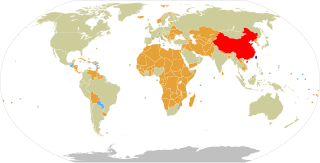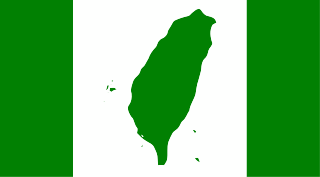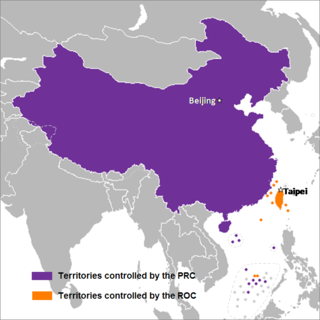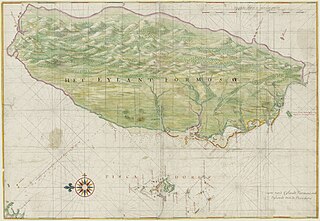
Palau, officially the Republic of Palau, is an island country in the Micronesia subregion of Oceania in the western Pacific. The republic consists of approximately 340 islands and connects the western chain of the Caroline Islands with parts of the Federated States of Micronesia.

Taiwan, officially the Republic of China (ROC), is a country in East Asia. The main island of Taiwan, also known as Formosa, lies between the East and South China Seas in the northwestern Pacific Ocean, with the People's Republic of China (PRC) to the northwest, Japan to the northeast, and the Philippines to the south. It has an area of 35,808 square kilometres, with mountain ranges dominating the eastern two-thirds and plains in the western third, where its highly urbanized population is concentrated. The combined territories under ROC control consist of 168 islands in total covering 36,193 square kilometres. The largest metropolitan area is formed by Taipei, New Taipei City, and Keelung. With around 23.9 million inhabitants, Taiwan is among the most densely populated countries.

Foreign relations of the Republic of China (ROC), more commonly known as Taiwan, are accomplished by efforts of the Ministry of Foreign Affairs of the Republic of China, a cabinet-level ministry of the Government of the Republic of China. As of January 2024, the ROC has formal diplomatic relations with 11 of the 193 United Nations member states and with the Holy See, which governs the Vatican City State. In addition to these relations, the ROC also maintains unofficial relations with 59 UN member states, one self-declared state (Somaliland), three territories (Guam, Hong Kong, and Macau), and the European Union via its representative offices and consulates. In 2021, the Government of the Republic of China had the 33rd largest diplomatic network in the world with 110 offices.

Taiwanese cuisine is a popular style of food with several variations, including Chinese and that of Taiwanese indigenous peoples, with the earliest cuisines known of being the indigenous ones. With over a hundred years of historical development, mainstream Taiwanese cuisine has been influenced by Hakka cuisine, the cuisines of the waishengren, Japanese cuisine, and American cuisine, with southern Fujian cuisine having had the most profound impact.

The Taiwan independence movement is a political movement which advocates the formal declaration of an independent and sovereign Taiwanese state, as opposed to Chinese unification or the status quo in Cross-Strait relations.

The member states of the United Nations comprise 193 sovereign states. The United Nations (UN) is the world's largest intergovernmental organization. All members have equal representation in the UN General Assembly.

Chinese unification, also known as Cross-Strait unification or Chinese reunification, is the potential unification of territories currently controlled, or claimed, by the People's Republic of China and the Republic of China ("Taiwan") under one political entity, possibly the formation of a political union between the two republics. Together with full Taiwan independence, unification is one of the main proposals to address questions on the political status of Taiwan, which is a central focus of Cross-Strait relations.
The political status of Taiwan or the Taiwan issue is an ongoing geopolitical dispute about Taiwan, currently controlled by the Republic of China (ROC), that arose in the mid-twentieth century. Originally based in mainland China before and during World War II, the ROC government retreated to Taiwan in 1949 after it was defeated by the Chinese Communist Party (CCP) during the Chinese Civil War and the subsequent establishment of the People's Republic of China (PRC). Since then, the effective jurisdiction of the ROC has been limited to Taiwan, Penghu, Kinmen, Matsu, and smaller islands.

The Constitution of the Republic of China is the fifth and current constitution of the Republic of China (ROC), ratified by the Kuomintang during the Constituent National Assembly session on 25 December 1946, in Nanking, and adopted on 25 December 1947. The constitution, along with its Additional Articles, remains effective in ROC-controlled territories.

As a result of the surrender and occupation of Japan at the end of World War II, the islands of Taiwan and Penghu were placed under the governance of the Republic of China (ROC), ruled by the Kuomintang (KMT), on 25 October 1945. Following the February 28 massacre in 1947, martial law was declared in 1949 by the Governor of Taiwan, Chen Cheng, and the ROC Ministry of National Defense. Following the end of the Chinese Civil War in 1949, the ROC government retreated from the mainland as the Chinese Communist Party (CCP) proclaimed the establishment of the People's Republic of China. The KMT retreated to Taiwan and declared Taipei the temporary capital of the ROC. For many years, the ROC and PRC each continued to claim in the diplomatic arena to be the sole legitimate government of "China". In 1971, the United Nations expelled the ROC and replaced it with the PRC.

Cross-strait relations are the political and economic relations between mainland China and Taiwan across the Taiwan Strait.

"Taiwan, China", "Taiwan, Province of China", and "Taipei, China" are controversial political terms that claim Taiwan and its associated territories as a province or territory of the People's Republic of China.
Taiwanese people are the citizens and nationals of the Republic of China (ROC) and those who reside in an overseas diaspora from the entire Taiwan Area. The term also refers to natives or inhabitants of the island of Taiwan and its associated islands. The term generally applies to inhabitants on the island of Taiwan who share a common culture, ancestry and speak Mandarin, Hokkien, Hakka, or indigenous Taiwanese languages as a mother tongue. After the ROC government's retreat to Taiwan in 1949, the actual-controlled territories of the government were limited to the main island of Taiwan and Penghu, whose administration were transferred from Japan in 1945, along with a few outlying islands in Fujian Province which include Kinmen and Matsu Islands. Nowadays, Taiwanese people as a demonym may broadly refer to the indigenous peoples of Kinmen and Matsu as they share the same national identity with people of Taiwan. However, the islanders of Kinmen and the Matsu may not consider the "Taiwanese" label to be accurate as they were traditionally a part of Fujian and not Taiwan, maintaining a distinctive identity from that of the Taiwanese.

The concept of Two Chinas refers to the political divide between the People's Republic of China (PRC) and the Republic of China (ROC). The PRC was established in 1949 by the Chinese Communist Party, while the ROC was founded in 1912 and retreated to Taiwan after losing the Chinese Civil War.

Cédric Kanté is a former professional footballer who played as a defender. Born in France, he played for the Mali national team internationally winning 41 caps and scoring once.

Kausea Natano is a politician who served as the Prime Minister of Tuvalu from 19 September 2019 to 26 February 2024. He represented Funafuti as a Member of Parliament. He was first elected in the 2002 Tuvaluan general election and served as an MP until he was unseated in the 2024 Tuvaluan general election.

The bilateral foreign relations between the Republic of the Philippines and Republic of China (Taiwan) are a subject of China–Philippines relations. Among other issues between the two are the South China Sea dispute and the political status of Taiwan.

Chinese irredentism involves irredentist claims to the territories of former Chinese dynasties made by the Republic of China (ROC) and subsequently the People's Republic of China (PRC).
Island Nation is a Taiwanese political drama based on Taiwan's transition from an authoritarian state to a democracy in the 1990s. The series will include 80 episodes over 8 seasons, with the first season premiering on January 20, 2020. The second season, Island Nation 2, debuted on September 12, 2021.













